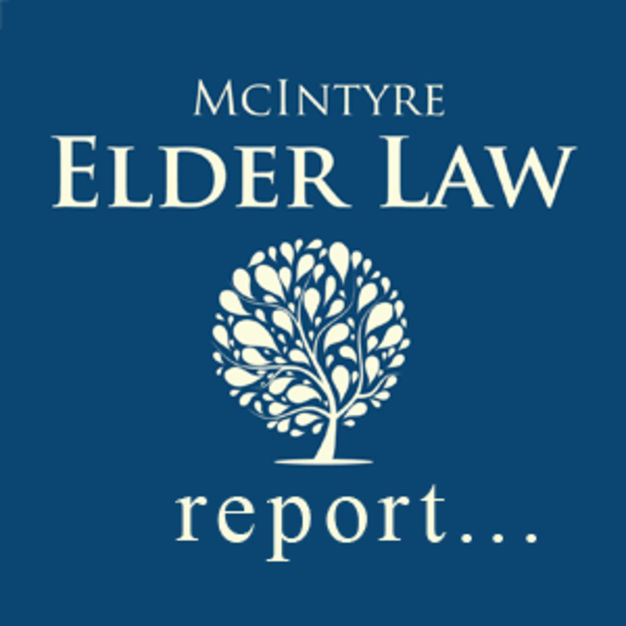
Elder Law Today Podcast
Elder Law Today
Are you a senior citizen? Or perhaps you have a parent, relative, close friend or neighbor who is one. If so, then you won?t want to miss this important and informative podcast. Learn about elder law, a relatively new area of law, that encompasses the legal issues that acutely affect seniors and their families. Yale Hauptman, an elder law attorney, discusses the various problems and issues of aging in America today and interviews guests from other elder care fields.
- The Holidays - A Time to Consider Elderly Loved Ones
Once again the holiday season is upon us, a time of joy but also stress. We often visit family members we haven’t seen in some time and that’s when changes in older loved ones become more noticeable. Some of the changes that may indicate your loved one needs some extra help:
1. Weight loss2. Deterioration in personal hygiene3. Unusually dirty or messy home4. Unusually loud or quiet, paranoid or agitated behavior5. Local friends and relatives noticing changes in behavior6. Self-imposed isolation, stops attending activities7. Signs of forgetfulness such as unopened mail, piling newspapers, missed appointments, unfilled prescriptions8. Signs of poorly managed finances, such as not paying bills, losing money, paying bills twice9. Unusual purchases
So what should you be doing if you see any of the above? A physical and neurological exam should identify any medical issues. A Geriatric Care Manager (GCM) can help assess the options available that will allow your loved one to continue to live a full, fruitful and safe life. Suggestions may include a home health aide, adult day care, and personal organizer to help with money management.
If your loved one can no longer live alone, possible alternative living arrangements include another family member’s home, assisted living, senior housing or nursing home. Each choice has pros and cons and expense is often an issue. Planning should be done as early as possible to determine what government benefits can be tapped to help pay the cost, such as Medicare, Medicaid and Veteran’s benefits.
Because the family is together once again, the holidays are a good time to begin discussing these difficult decisions. For example, if one child lives nearby an aging parent and sees the decline on a daily or weekly basis, and the other child does not, there is often a tendency for that second child to downplay or minimize the decline, often basing his/her opinion on phone calls with the parent. But seeing the parent and visiting their home can alter that perception.
Remember, there are resources available to you. All you need to do is find them or consult with someone knowledgeable, such as an elder care attorney, who can help point you in the right direction. But, don’t put it off till next year. By that time you may be dealing with a full blown crisis.
30 November 2009, 11:00 am - A Pension Crisis Brewing?
Much has been written in recent years about the health of Social Security. As the population ages two things are happening. Fewer people are paying into the system, while at the same time more people are receiving benefits, raising concern that the program will run out of money. But there is another, perhaps, more serious crisis developing within state employee pension programs that hasn’t, until now, received as much attention. We are seeing it here in New Jersey, as are other states across the country. And it may hit some folks harder than the Social Security problem because so much more of their retirement income may be derived from a state pension than from Social Security.
As the economy remains in a funk and financial markets still struggle to recover from huge losses over the past couple of years, many pension systems have seen their investments take a big hit. Since the beginning of 2009, for example, New Jersey ‘s pension fund has lost almost 13% in value, $10 billion to be exact. It hasn’t helped that the government has taken money from the pension system to plug budget gaps in other areas in past years.
Now, our new governor, Chris Christie, is assessing the situation. Will he be the one to make some hard decisions? Our outgoing governor already has signed legislation raising the retirement age and barring retirement payouts for part time employees paid less than $7500 per year. You can be sure other changes are coming from the new governor. There have to be. There isn’t enough money to pay everyone who will be entering the pension system in the next 30 years. The state has to close the gap somehow.
Now, ask yourself what you would do if the State cut your pension by 10%, 20% or more. What would you do to replace that income? And what would you do if you were then faced with rising long term care costs? The government is dealing with a fiscal crisis. It is doing the same things we all do when we are faced with a financial crisis – tighten our belts and cut costs.
The signs are there. You just have to pay attention – and take the opportunity to protect yourself and our families. Don’t assume the government will be there to protect you. It’s busy trying to fix it’s own problems. You’ve got to take care of your own. And the time to do it is now.
23 November 2009, 11:00 am - Another VA Benefit You Never Heard Of
Understanding the maze of laws and benefits that form our long term care system is a full time job. That’s why I devoted my practice exclusively to elder and disability planning. A few weeks ago I was reminded of that fact when I was asked what I know about a particular VA program that provides adult day care services for a small co-pay. This clearly didn’t sound like the Aid and Attendance program that in the past two years we have incorporated into our planning arsenal.(see my 2/25/08 post). So I decided to investigate and here’s what I learned.
The VA doesn’t do a good job of publicizing its benefits and services so getting accurate information is never easy. There is a program of services under what the VA calls the Geriatric and Extended Care Program. These include programs that provide care in a veteran’s home or in a community setting such as adult day care, specialized services for rehabilitation following, amputation, stroke, traumatic brain injury and spinal cord injury, physical therapy and home hospice care. Keep in mind that the range of services can vary greatly depending on where you live and which health care network the VA has charged with providing those services.
Uncovering and understanding the eligibility requirements is the harder part. Unlike the Aid and Attendance program which is available to veterans and their spouses, the Extended Care Program is only available to veterans who received a discharge under honorable conditions. It is, however, not limited to veterans who served during wartime (again, unlike Aid and Attendance). There is no length of service requirement for vets who enlisted before 1980.
There is a co-pay requirement applicable to the nonservice connected veteran, that is, a veteran who’s injury or illness is not linked to his military service (which is the case with most of our elderly clients). In order to be eligible the veteran’s income must not exceed the maximum annual pension rate for the Aid and Attendance program. The co-pay generally ranges from $5 to $97 per day, depending on the particular service received.
What I concluded from my research so far is that the Extended Care Program is another option, another piece of the long term care puzzle. And with proper guidance our clients may be able to tap into a valuable source which will help lessen the risk that they will run out of money and options when they reach the next step in the long term care journey.
16 November 2009, 11:00 am - How Do You Know if You are Getting Accurate Medicaid Information?
How many times have you contacted a government office to inquire about some benefit or program and told you are not eligible? Have you then left the office or hung up the phone accepting that what you have been told is true? What if that is just flat out wrong? As an elder law attorney I see that happen all the time, especially when it comes to the Medicaid program. A recent court case last week corrected at least one of those untruths.
A federal court last week finally weighed in on a particular exception to the Medicaid transfer rules that the State of New Jersey has, for some time, misinterpreted. A transfer of assets from parent to child, if made within 5 years of the date of application for Medicaid benefits, carries a Medicaid penalty, but there are some exceptions to that general rule. If the transfer is made to a child, or to a trust for the benefit of the disabled child, then that transfer is not subject to a Medicaid penalty. The State has for as long as I can remember, insisted that this exception applies only if the transfer is to a trust for the sole benefit of the disabled child.
Now, if you are not familiar with the ins and outs of the Medicaid laws, and were told that your mother is ineligible for this reason, what would you do? Probably go home and wait till the Medicaid penalty expires, not knowing any better. My staff has reported back to me on some of our cases the same thing. I then have to go back to the federal law and state regulations interpreting that law to find the exact sections that support our claim. Sometimes that is enough to resolve the issue, but other times, such as in the case of Sorber v. Velez, the case decided last week, the State doesn’t budge and we, as elder law attorneys, have to resort to the court system to settle the dispute. In the Sorber case, the issue came down, in part, to the type of grammar lesson you might remember from elementary school about the proper placement of a comma. The State’s interpretation didn’t seem logical and the court agreed.
One of my staff asked me the other day why the State would take a position that seems so farfetched. The answer, I think, can be found by looking at the bigger picture of what is playing out in this country. The government doesn’t have enough money to fund the programs and services it currently has. Looking at what’s coming, the number of people facing a long term care crisis will continue to increase in the next 20 years as 77 million baby boomers reach senior status. So, you can expect the State to continue to interpret eligibility standards very strictly. And sometimes they’ll get it completely wrong. That’s why the “do it yourself” approach is dangerous. You could be losing valuable benefits and without the assistance of someone with knowledge of the laws you wouldn’t even know it. The government wants to push you to the back of the line. Make sure you protect yourself and fight to maintain your spot at the front .
9 November 2009, 11:00 am - Mary's Worst Home Care Nightmare
For many families, keeping their elderly loved one at home will require in home assistance. There are many quality home health care companies in the area so finding one isn’t a problem. But I find so often that clients don’t go through a licensed agency because of the cost. While I have written in the past about the Medicaid problem of hiring aides directly and paying cash (7/20/09 post), there is another very real risk, safety. The following story is one, unfortunately, I have heard more than once.
Mary found an aide to care for Dad through an agency she had learned of from a friend. I know many of the quality licensed agencies in the area but had never heard of this one. Mary paid a fee to the agency, who sent an aide to her dad’s home but her financial dealings with the agency ended there. She paid the aide directly in cash. I cautioned Mary that she didn’t really know anything about the agency or the person they were sending but she said she interviewed the woman, who seemed pleasant enough. And Mary was in a bind because Dad had run out of money so she was paying out of her own pocked. Now the aide she had found herself and whom had stayed with Dad for 3 years was going back to her native country. Mary needed to find someone quickly and cost was a real issue.
What happened after one month was Mary’s worst nightmare. On one of her daily visits to Dad’s home she found him bruised and battered, in a semiconscious state. He had been beaten by the aide, who claimed not to know what happened. Mary called the police. They immediately arrested the aide and Dad was transported to the hospital.
Upon further investigation, Mary discovered that the agency was neither licensed nor insured. The owner disappeared, probably to reappear under another agency name. And unfortunately Dad’s injuries were of a severity that he could no longer stay at home, but needed nursing home care. Mary felt terrible, but her predicament is hardly uncommon. When trying to make ends meet safety was compromised. Bringing a complete stranger into a home to care for a defenseless senior should not be taken lightly. Background checks must be done. Training is important. There is a reason going through a reputable agency is more expensive.
However, if a long term care plan had been put in place, well before Dad needed care, perhaps Mary would not have been strapped for cash. Dad would have the money to pay for his own care, maybe government benefits could have been tapped to help out. Mary would then have hired the licensed agency, safety precautions would have been taken, and a tragedy could have been avoided.
2 November 2009, 11:00 am - How Can the Government Tell Me I Can’t Help My Family? (Part 2)
Let’s pick up where we left off with Mary. Her son, Jim is unemployed and Mary has been giving him funds totaling $50,000 over the last 6 months to help him pay his bills. And she intends to continue doing so until he finds a job. While Mary is 70, healthy and not thinking she’ll ever need long term care, I explained to her that if her health takes a turn, the transfers to Jim will make her ineligible for government benefits should she run out of money. That is a very real possibility, with the cost of care currently averaging over $100,000 per year in her area. So what can we do?
We can set up a trust to which Mary transfers assets. The trust then provides the funds to Jim. Now, you may be thinking, “doesn’t this create the same problem Mary already has by giving Jim money each month or two?” Yes, but by having Mary transfer the money in one lump sum Medicaid’s 5 year lookback is applied one time so we know when it will expire. If she transfers a little bit at a time Mary creates a new 5 year lookback for each separate transfer. But isn’t there a potential Medicaid penalty when the trust gives money to Jim? No, because Medicaid only looks at Mary’s transfers, not the trust’s.
Some may read this and conclude that this is just a way for Mary to avoid using her money for long term care and have the government pay her bills instead. But is that really what is going on here? Cleary not. Mary isn’t even thinking about long term care (although she clearly needs to). Through the use of a trust she can accomplish both goals, helping her son get back on his feet and providing for her own needs. If she gets sick she’ll definitely need to use some of her funds for her own care but when she spends down completely, if done properly, she will be ready for Medicaid. And that benefits not only Mary, but also the providers of her care who will receive those benefits, whether it be a nursing home, assisted living facility or home health care agency.
The long term care provider will know that after Mary spends down her assets she will qualify for Medicaid without any surprise ineligibility periods imposed by Medicaid. And Mary will know that she can be there for her family and still meet her own needs. Mission accomplished.
26 October 2009, 10:00 am - How Can the Government Tell Me I Can't Help My Family?
Mary had been reading my blog posts for some time now about the need to plan ahead for long term care. Something struck a chord with her and she called. She has a home and about $200,000 in investments. While still healthy, she is 70 and thinking about the future. I then asked her if she had made any gifts to her kids or grandkids. She replied, “No gifts but I am helping out my son Jim a little bit because he has been out of work for 6 months”.
“Well, Mary, actually, the money you are giving your son may disqualify you for government benefits down the road, should you need them”, I explained. Mary became exasperated. “Jim has had such a tough time finding a job in this economy. How can the government tell me I can’t help my family when they are in need?” The reason for this, if you have been reading my posts over the past number of months, is the Medicaid spend down rules. The government wants you to spend your money on your own long term care first, before asking for assistance.
Now, not all your money must be spent on long term care. But it must be spent in such a way that you are getting something of equal value back. Mary heard this and in an exasperated tone cried, “what could provide me greater value and satisfaction than helping to keep a roof over my son, daughter-in-law and grandchildren’s heads and food on the table, until Jim can get back on his feet? My parents helped us out when my husband lost his job. In tough times our family has always pulled together and pitched in. Jim is a good son. He just needs a break.”
While you and I may view Mary’s help as essential and proper, unfortunately the government does not. Mary estimates that she has given Jim $50,000 over the last 6 months and intends to continue to do so. Right now, however, she has a potential Medicaid penalty of about 7 months and that will only increase if she continues to advance funds to Jim.
Mary is really getting agitated now. “So are you telling me I have to stand by and watch Jim lose his house -- that I can’t do anything?” “Not at all”, I replied. “You can be there for Jim, but we have to do it in a way that won’t create long term care problems for you down the road.” In next week’s post I’ll share with you what I told Mary.
19 October 2009, 10:00 am - I Don't Have an Estate Tax Problem --- Do I?
A few months back I wrote about how estates up to $3,500,000 are not subject to federal estate tax and that the tax will be eliminated in 2010. For this reason, when people call our office to discuss estate planning they will often begin by saying that they are not concerned about estate tax. I have to correct them, however, because most states have their own estate tax that may kick in on smaller estates where the federal tax isn’t a concern. So, how big might such an estate tax bill be?
First, a little background. Under the previous law, Congress permitted a dollar for dollar credit towards the federal estate tax for any state estate and inheritance taxes paid up to a certain limit. So, many states established their estate tax structures to “soak up” the maximum credit that Congress permitted. In essence, the federal government shared a portion of its tax revenue with the states. When it raised the federal exemption, however, Congress decided it could no longer share a smaller tax revenue with the states so it phased out this credit. Many states, in response, changed their tax laws to preserve their revenue stream. New Jersey now has an estate tax that kicks in on estates greater than $675,000 and New York on estates greater than $1,000,000.
New Jersey’s estate tax starts out at 4% and gradually increases to a maximum of 16%. New York’s estate tax also maxes out at 16%. As I explain to our clients, we usually see federal estate taxes in the six figure to seven figure range and state estate taxes in the tens of thousands of dollars on the low end, and hundreds of thousands of dollars on the higher end.
What can you do to reduce, or even eliminate this tax? Well, for starters, in the case of married couples, a bypass or credit shelter trust should be employed. This will save substantial amounts of tax that would be paid by children at the death of the second parent to die. But you must have this trust set forth in your will before you pass away.
What if that opportunity has already passed? Purchasing life insurance to pay the tax is another solution, which may be especially desirable where the estate consists of real estate that the family doesn’t want to sell just to pay the tax. And, placing that insurance in a life insurance trust is usually a good idea. Otherwise, you end up paying estate tax on the life insurance that you bought to pay the tax in the first place.12 October 2009, 10:00 am - New York's New Power of Attorney - What Does it Mean for You?
On September 1, 2009 New York’s new power of attorney law became effective. There has been much written about it. The intent of lawmakers was to correct the financial abuses that seem to increase in frequency, probably due to the aging of our populace. As with any new law, however, what lawmakers envision and what actually occurs often differ greatly. But, what does the new law mean for you?
First, let’s run through the major changes. One of the biggest changes is the creation of a “statutory major gifts rider”. This is a document separate from the power of attorney that specifically authorizes major gifts and other transfers (defined as greater than $500 per person per calendar year). No longer can the principal (the person executing the power of attorney) authorize gifts in the body of the power of attorney document. This will impact many long term care plans in which assets are placed in trust, for example. If the principal can no longer make the transfer and a child, as agent under power of attorney, needs to complete that transaction, New York law now requires this separate rider.
A second important change focuses on the execution of the document. Now the principal and the agent must sign the document in front of a notary and two disinterested witnesses. The signings need not, however, occur at the same time. The agent may sign at a later date than the principal.
A third major change is one that at first might not seem like much. Any new power of attorney automatically revokes all previous power of attorney unless the principal expressly states otherwise in a special “modifications” section. This could really wreak havoc upon estate and long term care plans. Think about it. How many times have you gone into a bank and executed a limited power of attorney appointing a family member as agent for a particular account? If that document doesn’t expressly state your wish not to revoke your general power of attorney or any other limited power of attorney that you signed previously then they all are revoked. What if the bank employee doesn’t point this out to you? They may not even be aware of this provision.
It will be interesting to see what impact the new law will have. Will it correct financial abuses of the elderly? Will it be too restrictive and hamper families in their ability to care for elderly members? Will there be any unintended consequences that nobody foresaw? And will other states follow suit? One thing should be clear. Consult your elder or estate planning attorney before you execute any other powers of attorney.
5 October 2009, 10:00 am - Should I Take Social Security Early or Not?
One of the more common questions asked of me is “should I take Social Security early?”. The questioner is referring to the ability to take Social Security as early as age 62, rather than waiting till the full time retirement age of 65. (By the way that age gradually increases for those born after 1937 until it reaches age 67 for those born 1960 or later.) Taking early Social Security reduces your monthly payment by ½ of 1 percent for the number of months before age 65 you start those checks coming. If you enroll at age 62 you will get roughly 75% of what you would receive at age 65. Ok, those are the basics. So, what’s the answer?
Well, it depends. There isn’t a “one size fits all” solution here. But let’s analyze this a bit. One consideration is going to be, “How long do I think I will live and what is my break even point?” For example, if I wait until age 65 to take my benefit how long will I need to live before I come out ahead by giving up a lesser benefit at an earlier age? That may also be impacted by what I do with the money if I take it early. If I have sufficient other income and I invest the Social Security that will affect the calculation.
But, wait. That’s not the only consideration. If I am still working when I take an early benefit I can lose some of that Social Security if my income exceeds a certain level (this changes from year to year). And, what about my spouse? When one spouse dies, the surviving spouse is entitled to receive the larger of the two checks. So that may work into this as well.
As you can see, there are many things to consider. There is a certain amount of guesswork involved as well. The best answer I can give, however, is to consult with your professional advisors – financial, tax and elder law – to run some numbers. What is best for you will most likely not be best for the person seated next to you. There are just too many variables for there to be one right answer. But, one thing I can unequivocally say is that you should “run the numbers” before you reach age 62. It might be right for you and you wouldn’t want to pass up that opportunity if it makes financial sense.
28 September 2009, 10:00 am - NFL Seat Licenses and Medicaid -- Huh?
I met with a family with the following scenario. Dad needed nursing home care and the family had done no long term planning. We talked about how under Medicaid rules the couple’s assets would be counted, divided in half and that Mom would be able to keep 50% of the assets up to a maximum of $109,540 and the home. We went through a list of their investments. I then asked if they had anything else of value. Son, Joe, mentioned that Dad had just signed up for Jets season tickets at the new stadium the Giants and Jets will be opening in 2010. “We want to keep the tickets in the family”, he said. “Dad can just transfer them to us, right?” That got me thinking. “I’m not so sure”, I replied.
If you’re a sports fan, by now you know all about seat licenses. Both the Giants and Jets are selling season tickets in a new way. Before you can have the privilege of buying a game ticket you must pay a fee, called a seat license. The better the seat, the higher the fee. Joe told me that the license for his family’s seats cost Dad $60,000. So, what do you think will happen if Dad just transfers his seats and later applies for Medicaid?
Certainly there is no mention of NFL seat licenses in any state Medicaid regulations. But, doesn’t the license have a value? Teams are telling their fans that they can resell the license, that it’s really an investment. It isn’t a stretch, then, for the State to treat the transfer of the license from one generation to another as a transfer for less than fair value subject to a Medicaid penalty. Especially since the State is facing huge budget deficits and can ill afford to pay out benefits to huge numbers of its residents. So, do I think that the State will let it go? Not likely.
Back to Joe and his parents. I told him that any transfer of the seat license had to be for fair value. But, that’s easier said than done. No one really knows what resale value they have since the licenses are brand new and can’t even be resold yet. There is a lesson to be learned though. Families with season ticket plans may want to consider transferring them to the next generation while healthy. Just another reason it’s a good idea to plan for long term care, and if you’re a Jet fan like me, you don’t want to miss out on the possibility of a Super Bowl trip. It’s gotta happen one of these years – right?21 September 2009, 10:00 am - More Episodes? Get the App
Your feedback is valuable to us. Should you encounter any bugs, glitches, lack of functionality or other problems, please email us on [email protected] or join Moon.FM Telegram Group where you can talk directly to the dev team who are happy to answer any queries.
 Caring For Aging Parents
Caring For Aging Parents
 Estate Planning TV
Estate Planning TV
 Tax & Estate Planning Law
Tax & Estate Planning Law
 Caregiver Stress
Caregiver Stress
 Senior Care Corner® Podcast
Senior Care Corner® Podcast
 Elder Law Report
Elder Law Report